- Home
- C. S. Pacat
Dark Rise: Dark Rise 1 Page 2
Dark Rise: Dark Rise 1 Read online
Page 2
A voice said, ‘Who are you?’
He jerked back, sudden, a stumble, only to realise – foolishly – that the voice had not come from the mirror; it had come from behind him. One of the warehouse labourers was staring at him suspiciously, a raised lamp in his hand. ‘Get back to work!’
Will blinked. The warehouse with its dank crates faced him, dull and ordinary. The gardens, the high pillars and the lady were gone.
It was as if a spell had broken. Had he imagined it? Was it the warehouse fumes? He had the urge to rub his eyes, half wanting to chase the image that he had seen. But the mirror was just a mirror, reflecting the ordinary world around him. The vision in it had vanished: a fantasy, a daydream, or a trick of the light.
Shaking off the dazed sensation, Will forced himself to nod his head and say, ‘Yes, sir.’
CHAPTER TWO
DAWDLING IN THE warehouse earned Will three weeks of docked pay and a demotion to some of the toughest work on the docks. He forced himself through it, though his muscles burned and his stomach cramped without food. The first three days were dredging and lifting, and then Will was put on wheel work, trudging to turn the warehouse’s giant wooden cylinder with six much bigger men, his legs aching as the wheel’s pulleys lifted giant casks eighteen feet in the air. He returned each night to his anonymous, overcrowded lodging house too exhausted to even think about the mirror or the strange things he’d seen in it, too exhausted to do more than tumble down onto the grimy straw pallet and sleep.
He didn’t complain. Crenshaw was still in business. He wanted this job. Even at reduced pay, dock labour was better than the living he’d scraped when he’d first come to London. He’d spent days scrounging for scraps before he’d learned to pick up burnt-out ends of cigars, dry them, then sell them to dockmen as tobacco for pipes. It was those men who had said you could get unskilled jobs on the docks if you were prepared to work hard enough.
Now Will hefted the last sack of barley onto its pile, long after most of the other men had left at the bell. It had been a punishing day’s work, double pace with no breaks, to try to make up for lost time when the barge came in late. The sun was setting, and there were fewer people on the foreshore, the last stragglers finishing up their work.
All he had to do was sign off with the foreman and he’d be free for the night. He’d head to the main street, where food sellers gathered to offer a bite to workers for the right price. A late finish meant that he had missed out on his scoop of pea soup, but he had a single coin that would buy him a hot potato in its jacket, and that would be enough to fuel him for tomorrow.
‘Foreman’s around front.’ Murphy indicated upriver with his chin.
Will scrambled to get there before the foreman left. He turned the corner, calling a goodbye to Beckett and the last of the workers, who stumbled off towards the public house. Crunching along the foreshore, he saw a chestnut seller in the distance crying his wares to the last of the dock labourers, his bearded face crimson with the fire shining through the holes at the bottom of his stove. Then he reached the empty pier.
That was when Will really looked at where he was.
It had grown dark enough that men had come out to light the grease lamps that coughed and spluttered, but Will had left those behind him. The only sounds were the slap of black water at the end of the pier and the distant calls of a dredging boat moving slowly from the canal to the river, netting whatever it could find. The pier was utterly deserted, with no hint of life.
Except for three men in a disused wherry half-hidden alongside the shadowy planking.
Will couldn’t have said the moment he realised it, or what caused it. There was no sign of the foreman. There was no one within earshot to hear a cry for help. The three men were getting out of the boat.
One of them was looking up. Right at him.
They found me.
He knew it at once, knew the purposeful look in their eyes, the way they were spreading out to block his path as they climbed out of the wherry.
Will’s heart jammed in his throat.
How? Why are they here? What had given him away? He kept to himself. He kept his head down. He hid the scar on his right hand with fingerless gloves. He had to rub at it sometimes to keep his fingers mobile, but he was very careful not to let anyone see when he did that. He knew from experience that the smallest gesture could betray him.
Maybe it was the gloves themselves, this time. Or maybe he’d just been careless, the anonymous boy on the docks not quite as anonymous as he’d hoped to be.
He took a step back.
There was nowhere to go. A sound behind him: there were two other men coming up to block his path, shadowy figures he didn’t recognise. But he knew the coordinated way the men were moving, fanning out to block his escape.
It was sickeningly familiar, part of his new life, like seeing her lying on blood-soaked ground and not knowing why, like months of hiding without the first idea why they had killed her or what they wanted from him. He thought of the last word his mother had said to him.
Run.
He sprinted for the only way out he could see, a stack of crates to the left of the warehouse.
Jumping for the top of the crates, he pulled himself up desperately. A hand snatched at his ankle; he ignored it. He ignored the shaking, the heart-thundering panic. It should be easier now. He wasn’t stupid with fresh grief. He wasn’t naive, like he had been those first nights, not knowing how to run or hide, not knowing to avoid the roads, or what happened when he allowed himself to trust someone.
Run.
No time to sprawl when he landed in the mud on the other side. No time to get his bearings. No time to look back.
He pushed himself up and started to run.
Why? Why are they after me? His feet slapped on the wet, muddy street. He could hear the men shouting behind him. It had begun to rain, and he ran blindly into the wet dark, over slippery cobbles. Soon his clothing was sodden and running was harder, his breath too loud in his throat.
But he knew the warren of streets and smaller lanes that were in constant construction, a mess of scaffolding, new buildings and new roads. He made for them, hoping to get far enough ahead to misdirect and hide, and let the men run past him. He ducked and wove between the planks and struts of construction and heard the men slow and fan out, looking for him.
I can’t let them know I’m here. Staying very quiet, he slipped in between struts and then into a space behind a high scaffold that laddered up a half-built structure.
A hand grabbed his shoulder; there was hot breath against his ear and a hand on his arm.
No. Heart pounding, Will struggled desperately, and when a wet hand clamped over his mouth, he stopped breathing—
‘Stop.’ The man’s voice was hard to hear over the rain, but it made Will’s blood run cold. ‘Stop, I’m not one of them.’
Will barely registered the man’s words, the sound he made muffled under the man’s heavy hand. They’re here. They’re here. They’ve caught me.
‘Stop,’ said the man. ‘Will, don’t you recognise me?’
Matthew? he almost said, recognising the voice with a jolt the moment the man said his name. The outline of one of the men from the river resolved into a figure he knew.
He went still, disbelieving his eyes as the man’s hand slowly lifted from his mouth. Half-obscured by the rain, the man was Matthew Owens, a servant of his mother’s in their old house in London. Their first house, their first life, before they had moved to a series of different out-of-the-way places, his mother never telling him why, but increasingly anxious, wary of strangers, watching the road.
‘We need to stay quiet,’ said Matthew, lowering his voice further. ‘They’re still out there.’
‘You’re with those men,’ Will heard himself say. ‘I saw you at the river.’
It had been years since he had seen Matthew, and now he was here, had chased him here from the docks, might have been chasing him since Bowhill—
> ‘I’m not one of them,’ said Matthew. ‘They only think I am. Your mother sent me.’
A renewed burst of fear. My mother’s dead. He didn’t say it, staring at Matthew’s grey hair and blue eyes. Seeing a familiar servant from the old household brought a child’s desire for safety, like wanting to be soothed by a parent after cutting his hand. He wanted Matthew to tell him what was happening. But the tug of childhood familiarity hit the cold reality of his life on the run. Just because I know him doesn’t mean I can trust him.
‘They’re right on your trail, Will. Nowhere in London is safe.’ Matthew’s low voice was urgent in the shadowed space under the scaffolding. ‘You must go to the Stewards. The bright star holds, even as the darkness rises. But you must hurry, or they will find you, and darkness will come for us all.’
‘I don’t understand.’ The Stewards? The bright star? Matthew’s words didn’t make any sense. ‘Who are those men? Why are they chasing me?’
Matthew took something from the pocket of his waistcoat as though it was very important, and held it out to Will.
‘Take this. It belonged to your mother.’
My mother? Danger and desire fought. He wanted to take it. The yearning was like a pain even as he remembered those awful final moments as she had looked up at him, her blue dress covered in blood. Run.
‘Show it to the Stewards, and they will know what to do. They are the only ones left who do. They will give you the answers, I promise. But there isn’t much time. I must return before they notice I’m gone.’
There was that unfamiliar word again. Stewards. Matthew placed what he held on to one of the planks of scaffolding that separated them. He was backing away, as if he knew Will wouldn’t take what he’d left while he was still there. Will gripped the scaffolding behind him tightly, wanting nothing more than to step forward towards the man whose grey hair and tattered black satin waistcoat were so familiar.
Matthew turned to go, but stopped at the last moment, looking back.
‘I’ll do what I can to throw them off your trail. I promised your mother I’d help you from inside, and that’s what I intend to do.’
Then he was gone, hurrying back towards the river.
Will was left with his heart racing as Matthew’s footsteps faded. The sounds of the other men were fading with him, as though their search was moving on. Will could see the outline, the shape of what Matthew had left him. He felt like a wild animal looking at bait in a trap.
Wait! he wanted to call out after him. Who are they? What do you know about my mother?
He stared out into the rain after Matthew, and then all his attention returned to the small package on the scaffolding. Matthew had said to hurry, but all Will could think about was the object that lay in front of him.
Had his mother really left it for him?
He came forward. It felt like he was being pulled by a string.
The package was a small, round shape, wrapped in the leather tie that Matthew had taken from the pocket of his waistcoat. Show it to the Stewards, Matthew had said, but Will didn’t know what Stewards were or where to find them.
Will reached out. He half expected those men from the docks to descend on him at any moment. He half expected this to be a trick or a trap. He picked up the package, his fingers numb with cold. Unwinding the tie, he saw a rusted piece of metal. He could barely feel its jagged edges, he was so cold. But he could feel its weight, unexpectedly heavy, as though it was made of gold or lead. Will angled it for better light.
And felt the shiver go through his whole body.
Roughly circular, twisted, it was an old, broken medallion. He recognised it. He had seen it before.
In the mirror.
A wave of dizziness passed over him as he stared down at the impossible in his hands.
The lady had worn this same medallion around her neck. He remembered the shine of it as she walked towards him, her eyes fixed on him as though she knew him. It had been shaped like a five-petalled hawthorn flower, and bright as new gold.
But its surface now was dull, cracked and uneven, as though years had passed – as though it had been buried and dug up, weathered and broken.
But the lady in the mirror was just a dream, she was just a trick of the light—
Turning it over, he saw that the medallion had writing engraved on it. It wasn’t written in any language he knew, but somehow he could understand the words. It felt like they were part of him, like they came from deep inside, a language that had always been there, in his bones, on the tip of his tongue.
I cannot return when I am called to fight So I will have a child
He didn’t know why, but he started to shake. The words in that strange language blazed in his mind. He shouldn’t be able to read it, but he could – he could feel it. He saw again the image of the lady’s eyes in the mirror, as if she was looking right at him. My mother’s eyes. Everything around him disappeared, until he could only see the lady, an aching sensation between them as they faced each other. I cannot return when I am called to fight. She seemed to say it directly to him. So I will have a child. He was shaking harder. ‘Stop,’ he gasped, wrapping his hands around the medallion, willing the vision to vanish with all his might. ‘Stop!’
It stopped.
Will was left breathing shallowly. He was alone, the rain dripping from his hair, soaking through his cap and his clothes.
Just like the mirror, the medallion was ordinary again. An old, dull thing, with no hint of what he had just seen. Will looked up to the place where Matthew had disappeared into the rain.
What was it? What had Matthew given him? His fingers gripped the medallion so tightly the jagged edges cut into him.
The streets by now were empty. No one had heard his gasp at the medallion’s vision. The men searching for him had moved on. It was his chance to get away, to run.
But he needed answers – about the medallion, and the lady, and the men who were chasing him. He needed to know why all of this was happening. He needed to know why those men had killed his mother.
Putting the medallion on its cord around his neck, he started running back through the rain, feet splashing in the mud. He had to find Matthew. He had to know what Matthew hadn’t told him.
The streets whipped past him. The eyes of the lady in the mirror burned in his memory.
When he finally came to a stop, panting, he saw that he had come almost all the way back to the warehouse.
Matthew was sitting on a street bench, a few blocks from the river. The street was better lit than the ones he had come from, and Will could see that Matthew was wearing buckled shoes and pleated pantaloons with his white shirt and black waistcoat.
Will had so many questions that he didn’t know where to start. He closed his eyes and drew a breath.
‘Please. You brought me that medallion. I need to know what it means. The Stewards – what are they? How do I find them? And those men – I don’t understand why those men are chasing me, why they killed my mother – I don’t understand what I’m meant to do.’
Silence. Will had spoken in a rush. Now, as the silence stretched out, he felt his need for answers transforming into a darker throb of fear.
‘Matthew?’ he said in a small voice. Though he knew. He knew.
It was raining hard, and Matthew was sitting out in it, oddly exposed. He wasn’t wearing a jacket. His arms were slack in his drenched shirtsleeves. His clothes were sopping on his body. Water dripped from his unmoving fingers. The rain was pelting him, running in streaming rivulets down his face, into his open mouth, over his dead open eyes.
They’re here.
Will threw himself – not along the road, but sideways towards one of the doors, a last desperate hope that he might alert the owner or find his way inside. He took the first blow at the outer gate. Before he could reach the door, a hand grabbed his shoulder; another closed around his neck.
No—
He saw the hair on one man’s arm and felt the hot breath of anoth
er against his face. It was the closest he had been to any of them since that night. He didn’t know their faces, but with clotting horror he saw one thing he did recognise.
On the underside of the wrist reaching for him, an S was branded into the man’s flesh.
He had seen that S before, at Bowhill. Burned into the wrists of the men who had killed his mother. He saw it when he couldn’t sleep, snaking into his dreams. It felt old and dark, like an ancient evil. Now it seemed to squirm over the man’s skin in raised, moving flesh, crawling towards him—
Everything he’d learned in nine months on the run vanished. It was as if he were back at Bowhill, stumbling away from the house and the men who were chasing him. The rain had made it hard to see that night, and easy to trip and fall, scrabbling down banks and splashing through ditches. He hadn’t known how long he’d pushed on until he collapsed, shivering and wet. He had wanted – it was stupid – his mother. But she was dead, and he was unable to go back to her because he’d made a promise.
Run.
For a moment, it was as if the S was reaching for him from out of a deep pit.
Run.
Thrown down hard onto his back on the soaking cobblestones, Will tried to push himself up, putting his weight on an elbow, and was shocked into gasping at the pain of his shoulder as his arm collapsed under him. They overmastered him immediately, though he used all his strength. He’d never had to fight before that night in Bowhill, and he wasn’t terribly good at it. Holding him down, one of the men hit him methodically until he lay, reeling, on his back in his sodden clothes, breathing as best he could.
‘You’ve had an easy life, haven’t you.’ The man raised his foot to nudge at Will briefly with his toe. ‘A mama’s boy, clinging to your mama’s skirts. That’s all done now.’
When he tried to move, they kicked him, again and again, until his vision turned black and he stopped moving altogether.
‘Tie him up. We finish up here, then take him to Simon’s ship.’
CHAPTER THREE
‘OUT OF THE way, rat.’

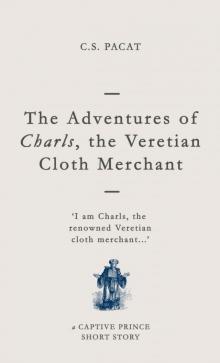 The Adventures of Charls, the Veretian Cloth Merchant
The Adventures of Charls, the Veretian Cloth Merchant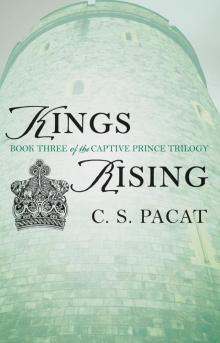 Kings Rising
Kings Rising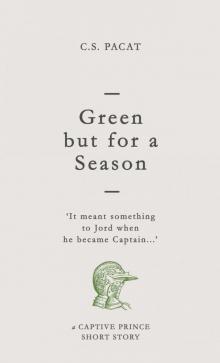 Green but for a Season
Green but for a Season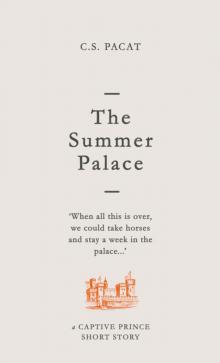 The Summer Palacee
The Summer Palacee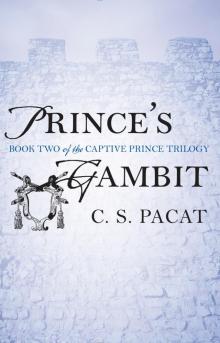 Captive Prince: Volume Two
Captive Prince: Volume Two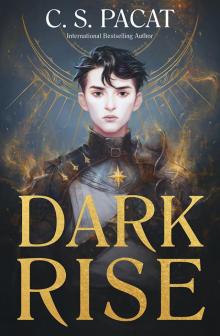 Dark Rise: Dark Rise 1
Dark Rise: Dark Rise 1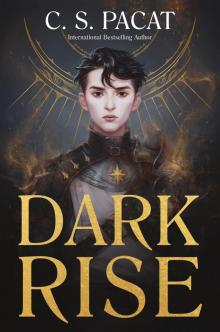 Dark Rise
Dark Rise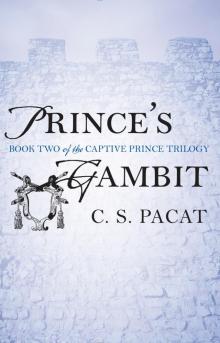 Captive Prince, Volume 2
Captive Prince, Volume 2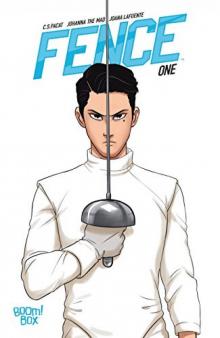 Fence 1
Fence 1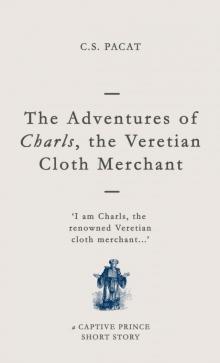 The Adventures of Charls, the Veretian Cloth Merchant: A Captive Prince Short Story (Captive Prince Short Stories Book 3)
The Adventures of Charls, the Veretian Cloth Merchant: A Captive Prince Short Story (Captive Prince Short Stories Book 3)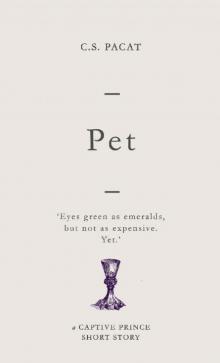 Pet: A Captive Prince Short Story (Captive Prince Short Stories Book 4)
Pet: A Captive Prince Short Story (Captive Prince Short Stories Book 4)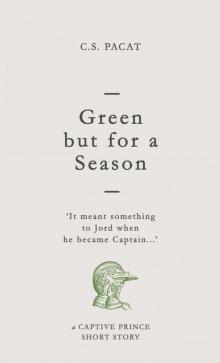 Green but for a Season: A Captive Prince Short Story (Captive Prince Short Stories Book 1)
Green but for a Season: A Captive Prince Short Story (Captive Prince Short Stories Book 1)